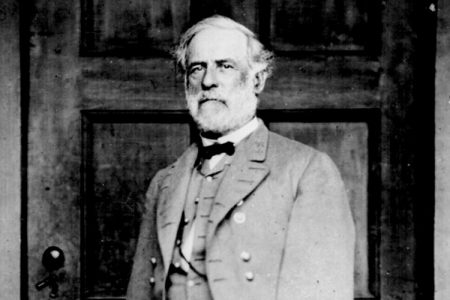Over at The Atlantic, Adam Serwer exposes what he calls “The Myth of the Kindly General Lee.” It’s well worth reading. Here’s a sample:
The myth of Lee goes something like this: He was a brilliant strategist and devoted Christian man who abhorred slavery and labored tirelessly after the war to bring the country back together.
There is little truth in this. Lee was a devout Christian, and historians regard him as an accomplished tactician. But despite his ability to win individual battles, his decision to fight a conventional war against the more densely populated and industrialized North is considered by many historians to have been a fatal strategic error.
But even if one conceded Lee’s military prowess, he would still be responsible for the deaths of hundreds of thousands of Americans in defense of the South’s authority to own millions of human beings as property because they are black. Lee’s elevation is a key part of a 150-year-old propaganda campaign designed to erase slavery as the cause of the war and whitewash the Confederate cause as a noble one. That ideology is known as the Lost Cause, and as historian David Blight writes, it provided a “foundation on which Southerners built the Jim Crow system.”
And…
Lee is a pivotal figure in American history worthy of study. Neither the man who really existed, nor the fictionalized tragic hero of the Lost Cause, are heroes worthy of a statue in a place of honor. As one Union veteran angrily put it in 1903 when Pennsylvania was considering placing a statute to Lee at Gettysburg, “If you want historical accuracy as your excuse, then place upon this field a statue of Lee holding in his hand the banner under which he fought, bearing the legend: ‘We wage this war against a government conceived in liberty and dedicated to humanity.’” The most fitting monument to Lee is the national military cemetery the federal government placed on the grounds of his former home in Arlington.
To describe this man as an American hero requires ignoring the immense suffering for which he was personally responsible, both on and off the battlefield. It requires ignoring his participation in the industry of human bondage, his betrayal of his country in defense of that institution, the battlefields scattered with the lifeless bodies of men who followed his orders and those they killed, his hostility toward the rights of the freedmen and his indifference to his own students waging a campaign of terror against the newly emancipated. It requires reducing the sum of human virtue to a sense of decorum and the ability to convey gravitas in a gray uniform.
Read the whole thing!


Great article – thanks for sharing.
The irony of the resurrection and sanctification of such “heroes” is that similar resuscitators would never do such for the likes of Jane Fonda. We are selective in those we call traitor.
On the other hand I really liked Lee’s character in the movie, “Gettysburg,” and the way he treated his soldiers. But then there is much good and evil in all of us.
Set up a statue for something good he did, if you want, but put it far, far from any vestiges of the Confederacy. That is a legacy to be buried, though not forgotten.